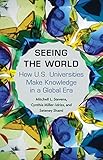Seeing the World : How US Universities Make Knowledge in a Global Era / Cynthia Miller-Idriss, Seteney Shami, Mitchell Stevens.
Material type: TextSeries: Princeton Studies in Cultural Sociology ; 14Publisher: Princeton, NJ : Princeton University Press, [2018]Copyright date: ©2018Description: 1 online resource (184 p.) : 1 line illus. 3 tablesContent type:
TextSeries: Princeton Studies in Cultural Sociology ; 14Publisher: Princeton, NJ : Princeton University Press, [2018]Copyright date: ©2018Description: 1 online resource (184 p.) : 1 line illus. 3 tablesContent type: - 9780691158693
- 9781400887965
- EDUCATION / Higher
- 9/11
- Area Studies Centers
- Area studies
- Central Asia
- Cold War
- Eurasia
- Middle East Studies
- Program on the Middle East and North Africa
- Russia
- Social Science Research Council
- South Asia
- US academy
- US foreign policy
- global affairs
- globalization
- interdisciplinarity
- international affairs
- internationalism
- modernization theory
- social science research
- study abroad programs
- world affairs
- world regions
- 378.73 23
- LA226 .S748 2018
- online - DeGruyter
- Issued also in print.
| Item type | Current library | Call number | URL | Status | Notes | Barcode | |
|---|---|---|---|---|---|---|---|
 eBook
eBook
|
Biblioteca "Angelicum" Pont. Univ. S.Tommaso d'Aquino Nuvola online | online - DeGruyter (Browse shelf(Opens below)) | Online access | Not for loan (Accesso limitato) | Accesso per gli utenti autorizzati / Access for authorized users | (dgr)9781400887965 |
Frontmatter -- Contents -- Acknowledgments -- Introduction -- Chapter 1. The world in US Universities -- Chapter 2. What is area Studies? -- Chapter 3. Departments and Not- Departments -- Chapter 4. Stone Soup -- Chapter 5. Numbers and languages -- Chapter 6. US Universities in the World -- Appendix -- Notes -- Index
restricted access online access with authorization star
http://purl.org/coar/access_right/c_16ec
An in-depth look at why American universities continue to favor U.S.-focused social science research despite efforts to make scholarship more cosmopolitanU.S. research universities have long endeavored to be cosmopolitan places, yet the disciplines of economics, political science, and sociology have remained stubbornly parochial. Despite decades of government and philanthropic investment in international scholarship, the most prestigious academic departments still favor research and expertise on the United States. Why? Seeing the World answers this question by examining university research centers that focus on the Middle East and related regional area studies.Drawing on candid interviews with scores of top scholars and university leaders to understand how international inquiry is perceived and valued inside the academy, Seeing the World explains how intense competition for tenure-line appointments encourages faculty to pursue "American" projects that are most likely to garner professional advancement. At the same time, constrained by tight budgets at home, university leaders eagerly court patrons and clients worldwide but have a hard time getting departmental faculty to join the program. Together these dynamics shape how scholarship about the rest of the world evolves.At once a work-and-occupations study of scholarly disciplines, an essay on the formal organization of knowledge, and an inquiry into the fate of area studies, Seeing the World is a must-read for anyone who cares about the future of knowledge in a global era.
Issued also in print.
Mode of access: Internet via World Wide Web.
In English.
Description based on online resource; title from PDF title page (publisher's Web site, viewed 27. Sep 2021)


